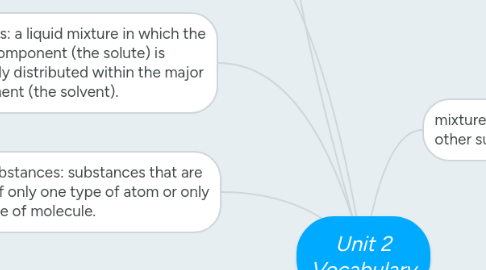Unit 2 Vocabulary
作者:Jessica Dunbar

1. elements: a substance that cannot be decomposed into simpler substances by chemical means, and is made up of atoms all with identical number of protons.
1.1. example: oxygen
2. compounds: a thing that is composed of two or more separate elements.
2.1. example: NaCl - salt
3. homogeneous mixtures: the same uniform appearance and composition throughout.
3.1. example: corn oil
4. heterogeneous mixtures: made of different substances that remain physically separate.
4.1. example: sand & sugar
5. pure substances: substances that are made of only one type of atom or only one type of molecule.
5.1. example: sulfur
6. solutions: a liquid mixture in which the minor component (the solute) is uniformly distributed within the major component (the solvent).
6.1. example: dissolving table salt in water
7. suspension: heterogeneous mixture in which solute-like particles settle out of a solvent-like phase some time after their introduction
7.1. example: sand in water
8. matter: physical substance in general, as distinct from mind and spirit; that which occupies space and possesses rest mass
8.1. example: solids, liquids, gases
9. mixtures: a substance made by mixing other substances together.
9.1. example: salt & water
10. colloids: homogeneous, noncrystalline substance consisting of large molecules or ultra microscopic particles of one substance dispersed through a second substance.
10.1. example: gels


